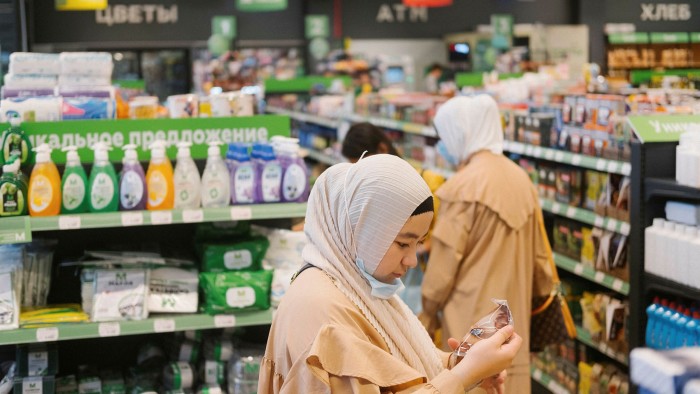Uzbekistan’s grocery sector set for boom time

Roula Khalaf, Editor of the FT, selects her favourite stories in this weekly newsletter.
Uzbekistan’s supermarket sector is set for fast growth. With a population of 34m and rising, and a shopping culture that is shifting from the traditional eastern bazaar to online deliveries, Central Asia’s biggest grocery market is expected to boom in years to come.
Already, the sector has attracted tens of millions of dollars in foreign investment. The European Bank of Reconstruction and Development has taken a $40m stake in Korzinka, one of the biggest supermarket chains, and French grocer Carrefour became the first international retailer to enter the market last year, intending to invest $100m.
“If everything continues the way it is, this is a market that is actually off to a good start,” says Alain Bejjani, head of UAE-based Majid Al Futtaim, Carrefour’s local operator.
Carrefour, a global top-10 food retailer, took its first step into Central Asia with a store in the country’s capital Tashkent because of Uzbekistan’s “sustained GDP growth and the reforms that have been established and followed,” Bejjani argues.
Uzbekistan’s gross domestic product had been growing by about 5 per cent a year, before sliding to less than 2 per cent in 2020 amid the pandemic. In the midterm, though, growth is expected to recover and keep that pace.
“We are happy to be part of that story,” Bejjani says. “Being the first international grocery retailer to come into the country is actually something that is a testimony to the direction that the country is taking, and we can contribute.”
Other international retailers to tap the Uzbek market last year included Russian discounter FixPrice, and Belarus’ Baraka Market, which plans 400 small supermarkets in the country by the year-end.
Uzbekistan has been reforming its economy by trying to open up and make it attractive for foreign business since Shavkat Mirziyoyev became president in 2016. A big reason for the recent retail expansion has been low participation by the state, officials and retailers say. That has been the case for a long time. Now, the state wants to see more business sectors in private hands, to replicate the success of retail.
“One of the biggest booms today is retail, food retail,” says finance minister Timur Ishmetov. “And the reason things are advancing so fast is because it is one of the few sectors with no state presence . . . the government doesn’t own stores and restaurants, so they can move ahead fast.”
Since the state liberalised the currency market by sending the som into free float in 2017, and stopped regulating commodity prices, while also lowering taxes for businesses and consumers, the retail sector has consolidated and expanded, says Zafar Khashimov, chief executive at Korzinka, which has been active in the market for 25 years.
“I don’t know a more liberal industry in Uzbekistan,” Khashimov says.
He estimates the total retail market volume at between $6bn and $8bn per year, of which supermarkets — or “organised retail” — makes up between just 7 and 10 per cent. But he expects that share to at least triple to 30 per cent in the next five years.
Carrefour’s and others’ outside estimates put organised retail’s share lower at 4 per cent, which would suggest even greater growth is possible.
There is no precise evaluation of the market size because farmers’ markets, which still dominate Uzbek retail, are difficult to track and calculate. However, data and company announcements suggest overall growth is likely.
Korzinka, which accounts for half of all supermarket turnover in the country, expects to expand its chain from 68 to 150 stores by 2025. Carrefour has opened three stores, and a further four to six are planned this year alone.
The biggest expansion is expected by Makro, Uzbekistan’s current leader by number of stores, with 109 mainly supermarkets and express shops. Makro plans to have between 800 and 1,000 stores in the next five years, its chief executive Roman Sayfulin says.
“It’s the start of the golden era for retail — certainly a beginning,” he says.
Sayfulin predicts Uzbekistan will bypass the hypermarket model. “In retail we will skip through this stage,” he says. “We are also moving straight to the consumer. We will not have this long stage of studying our buyer. We are moving fast because technology allows us to.”
More stories from this report
Uzbekistan’s reform agenda shows signs of slowing
Uzbekistan’s population boom poses problems for state
Uzbekistan fails to address human rights violations
Taliban takeover turns Uzbekistan into powerbroker
Uzbekistan pins hopes on renewable energy
Uzbekistan’s tentative steps towards a digital future
Uzbek consumers, as much as those in the rest of Central Asia, had traditionally preferred bazaars. They were a social outing as much as a provider of fresh produce, and offered a chance to negotiate with sellers on price. But the pandemic, with its restrictions on going outdoors, accelerated ecommerce growth in the country, says Khashimov of Korzinka — where online sales are still growing by double digits every month.
Sayfulin acknowledges that stores are still losing out to bazaars in the sale of fresh fruit and vegetables.
However, supermarkets are betting on simplifying the purchase and checkout process, with new technology such as online ordering and scan-and-go payment systems.
“We have made a bet on ecommerce, but we understand it doesn’t bring big money today,” says Sayfulin. “It has to do with culture, online payment systems, people’s trust, and physical ability of people to perform these orders. But in two-three years, this will be it. And whoever is first will feel the market the best.
“Supermarket business is not a sprint. It’s a marathon,” he adds.

Comments